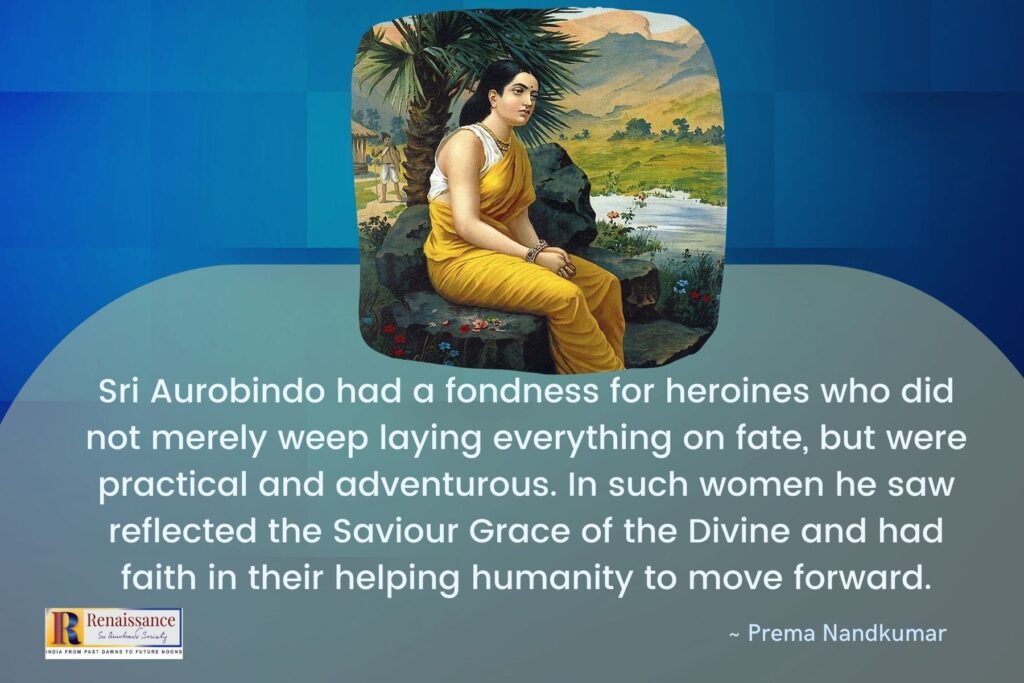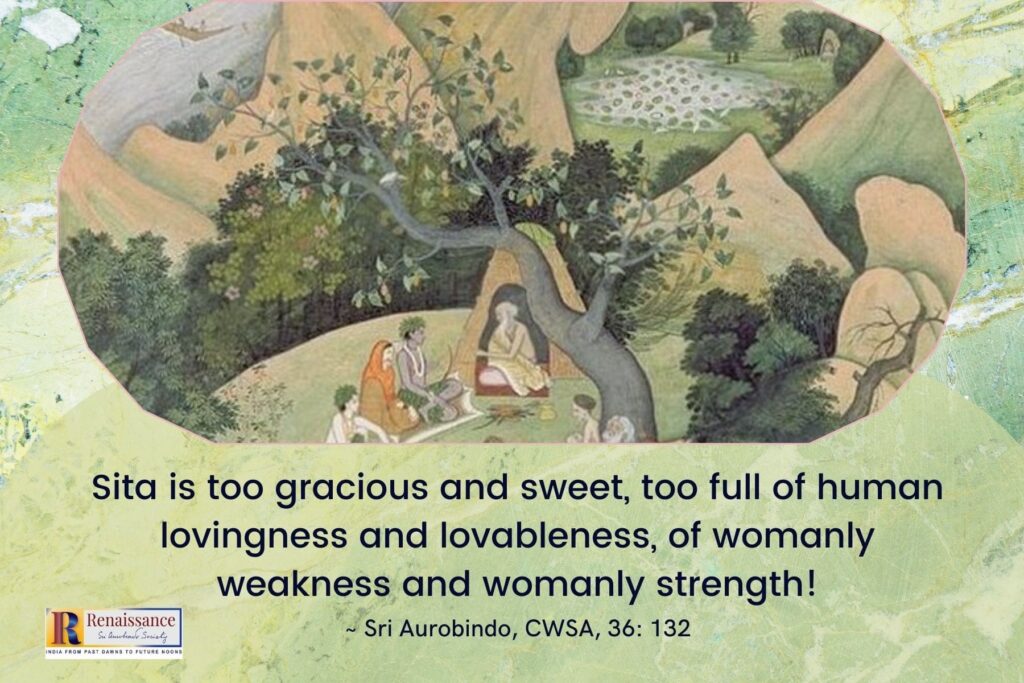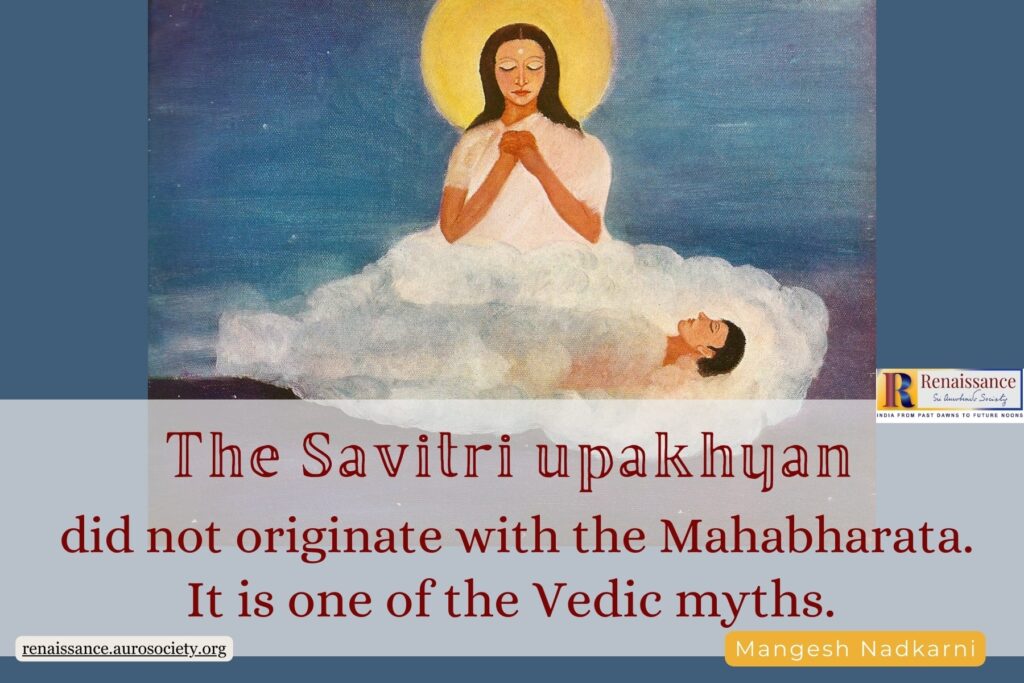CONTINUED FROM PART 1
Translating the Ramayana
Sri Aurobindo’s translations of a few selected passages from the Ramayana are among his earliest attempts to convey Indian poetry into English. The first two cantos of Aranyakanda were rendered into prose. He skipped the description of the hermitages, keeping strictly to the story-line. The Aurobindonian style is unmistakably there as when he translates ‘prajāḥ kāla ivāntakaḥ‘ into “Death the ender leaping on the nations”; and ‘kruddhō ruddhō nāga iva śvasan‘ into “his eyes filled with the rush of grief, panting like a furious snake controlled.” (CWSA, Vol. 5, pp. 24-26)
Sri Aurobindo chose a few passages from the epic for translation into English blank verse as well. Prof. K. R. Srinivasa Iyengar has traced an “artistic intention” in what appears as a random choice on the surface:
“… first the description of Ayodhya, then three forays into the magnificently dramatic Ayodhya Kanda. It is the perfect tragedy, the coronation turning into exile… Rama’s fate impinges with particular force on two women, Kausalya and Sita — the mother and the wife. Sri Aurobindo therefore chooses passages from Sarga 20 and Sargas 26-30 for translation: Kausalya’s tears are the background, while the issue between Rama and Sita is the foreground drama.
(K. R. Srinivasa Iyengar, Sri Aurobindo: A Biography and a History, 1972, p. 144).
“Only a few fragments chosen as if at random — An Aryan City, Dasaratha’s Speech to the States-General, A Mother’s Lament, The Wife — and, whether intended or not, there is here a whole drama packed with irony and catastrophe, poetry and pity, defiance and triumph.”
Watch:
Sri Aurobindo on the Significance of Ramayana
Since Sri Aurobindo felt that “a translator is not necessarily bound to the exact word and letter of the original he chooses; he can make his own poem out of it, if he likes, and that is what is very often done” (CWSA, Vol. 27, p. 199) his verse translations attempt no word-for-word representation. Yet, no vital detail is missed by him. Nor does he adventure out of bounds in the name of transcreation. What we have in his translations is Valmiki. Only the external garb is Aurobindonian English.
A Mother’s Lament
In the Sarga, ‘Kausalyakrandha’ we are made to watch in a flash the sad truths that often lurk behind the façade of high life. Kausalya, the chief consort of Dasaratha, mother of Rama, gives vent to her lifetime’s anguish in this canto. Slighted by the other wives of the king, and neglected by him — na drśtpūrvam kalyānam sukham vā patipauruśe — she seems not to have fared better even after the birth of Rama. And we had all the while thought of her as the proudest and happiest of ladies!
Sri Aurobindo brings out the waves of pain in Kausalya’s heart by using simple words that are most appropriate to Valmiki’s pellucid Sanskrit (Ayodhya Kanda, Sarga 20, Slokas 47-50):
Ah how shall I without thy face
~ CWSA, Vol. 5, p. 10
Miserably exist, without thy face,
My moon of beauty, miserable days?
Me wretched, who with fasts and weary toils
And dedicated musings reared thee up,
Vainly. Alas, the river’s giant banks,
How great they are! and yet when violent rain
Has levelled their tops with water, they descend
In ruin, not like this heart which will not break.
But I perceive death was not made for me,
For me no room in those stupendous realms
Has been discovered; since not even today
As on a mourning hind the lion falls
Death seizes me or to his thicket bears
With his huge leap,—death, ender of all pain.
* * *

The Wife
The five Sargas (26-30) from Ayodhya Kanda which are really one long argument between Sita and Rama form a single block. Sri Aurobindo had a fondness for heroines who did not merely weep laying everything on fate, but were practical and adventurous. In such women he saw reflected the Saviour Grace of the Divine and had faith in their helping humanity to move forward.
In all the ancient legends of India, there is one woman who does not shed tears even in the direst extremity. He chose her, Savitri, as the heroine of his immortal epic. Chitrangada, Uloupie, Vasavadutta, Comol Cumary: they are all capable of decisive action in times of crisis.
Though the Ramayana is known as ‘Sitayah Charitham Mahat’ (the noble story of Sita), the epic is mostly about Sita’s patient endurance. However, there is one instance when she does argue with Rama and wins too. Sri Aurobindo chose this particular episode for translation as it brings out the best in woman: self-sacrifice, practical wisdom, an ability to disregard ‘the comforts of life’ and shining idealism.
In this encounter with Rama, Sita is no gentle princess brought up in the lap of luxury but a wise counsellor and a willing life-partner. All her dreams of the grand coronation are shattered in a moment, but it is not the loss of Rama’s position that stings her.
It is when he advises her to be a silent and obedient subject of Bharata and live the fourteen years of exile away from him that she is incensed. The luxury of royalty does not tempt her for a moment. Spontaneous is the reaction of this high-born, high-souled heroine of Valmiki:
. . . but Videha’s daughter, she
~ CWSA, Vol. 5, p. 14 (Ayodhya Kanda, Sarga 27, Slokas 1-2)
Whose words were ever soft like one whose life
Is lapped in sweets, now other answer made
In that exceeding anger born of love,
Fierce reprimand and high. “What words are these,
Rama, from thee? What frail unworthy spirit
Converses with me uttering thoughts depraved,
Inglorious, full of ignominy, unmeet
For armed heroical great sons of Kings?
With alien laughter and amazed today
I hear the noblest lips in all the world
Uttering baseness.
In this passage as well as the following, Sri Aurobindo has elaborated upon the actual words of Sita. He seems to have been enthused to do so: just an extra word here and there for emphasis. However, the essential idea remains the same.
* * *

The picture of Sita grows in epic dimensions as she rejects all the comforts of life and prepares to walk by Rama’s side in the difficult, dim forests. When Rama tries to trip her by reminding her that a wife’s prime duty is to obey her husband’s will, she rejects it as a specious argument. But she does it sadly, for it pains her that Rama does not know her real self in spite of their loving each other and living together in mutual understanding. The voice is “sad and low” (duhkhita, mandarn vacanam):
Yea, thou who know’st, wilt thou, forgetful grown
~ CWSA, Vol. 5, p. 18 (Ayodhya Kanda, Sarga 29, Sloka 20)
Of common joys and sorrows sweetly shared,
The faithful heart reject, reject the love?
It must have been sincere admiration that led Sri Aurobindo to translate these Sargas which bring out the reserves of will-power in a frail woman. Anger, angry laughter, tears: now Sita takes up the sharpest arrow from her quiver and strikes with unerring aim into the manly heart of the hero.
Surely my father erred, great Mithila
~ CWSA, Vol. 5. p. 19 (Ayodhya Kanda, Sarga 30, Slokas 3-6)
Who rules and the Videhas, that he chose
Thee with his line to mate, Rama unworthy,
No man but woman in a male disguise.
What casts thee down, wherefore art thou then sad,
That thou art bent thus basely to forsake
Thy single-hearted wife? Not Savitri
So loved the hero Dyumathsena’s son
As I love thee and from my soul adore.
One subtle change introduced by Sri Aurobindo in this passage is Sita considering her love for Rama as of greater strength than Savitri’s for Satyavan. Valmiki’s Sita only says: Know me as Savitri who loved Satyavan deeply. Sri Aurobindo’s Sita wants to succeed in her mission, and such a changed emphasis adds power to her arguments, as the English language cannot put as much coiled power into its words as Sanskrit.
Sita wins and when Rama asks her to renounce
Our priceless diamonds and our splendid robes,
~ CWSA, Vol. 5, p. 22 (Ayodhya Kanda, Sarga 30, Slokas 44-45)
Our curious things, our couches and our cars,
The glory and the eye’s delight,. . .
she does so gladly and instantly, ksipram pramudita devi
Sita, of that consent
~ CWSA, Vol. 5, p. 22 (Ayodhya Kanda, Sarga 30, Slokas 46-47)
So hardly won sprang joyous, as on fire,
Disburdened of her wealth, lightly to wing
Into dim wood and wilderness unknown.
All of Sita is contained in these five Sargas. Sri Aurobindo’s choice was dictated by his heart which had summed up brilliantly the character of Janaka’s daughter in a letter written to Manmohan Ghose in 1899:
“Sita is too gracious and sweet, too full of human lovingness and lovableness, of womanly weakness and womanly strength!”
~ CWSA, Vol. 36, p. 132

Continued in PART 3
READ PART 1 HERE.
~ Design: Beloo Mehra


